Table of Contents
With the advent of COP28, the media are in full climate-alarm mode and climate tipping points are once again in the headlines.
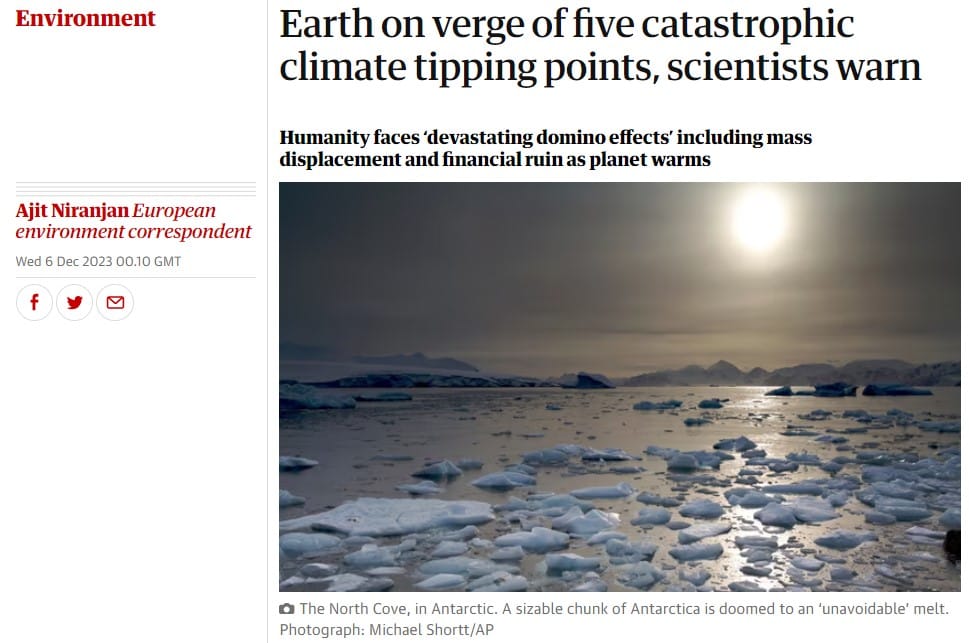
The Guardian article goes on to say:
Five important natural thresholds already risk being crossed, according to the Global Tipping Points report, and three more may be reached in the 2030s if the world heats 1.5°C (2.7°F) above pre-industrial temperatures.
Guardian
With a tiny bit of research the alarmist boffins could discover that this invented, catastrophically fearful, 1.5°C limit has already been reached and passed. Using the best and longest-running temperature records on the planet (Europe), we can see in the Berkeley Earth graph below that those temperature records show warming has already exceeded 1.5°C.
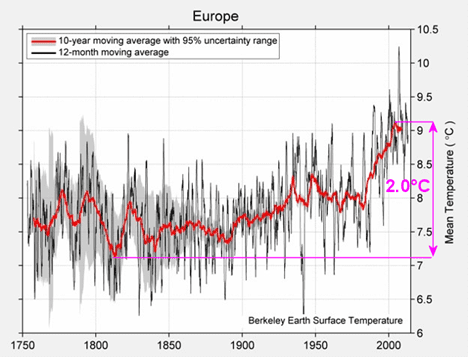
The 10-year moving average has already reached 2.0°C above pre-industrial levels and the sky has not yet fallen. But, don’t let facts get in the way of a climate-alarm narrative.
So, how are the previous tipping point alarm narratives getting on? Let’s review.
In 2005 the BBC reported, in an article titled Arctic ice ‘disappearing quickly’:

“It looks like this is exactly what we’re seeing – a positive feedback effect, a ‘tipping-point’.”
The idea behind tipping-points is that at some stage the rate of global warming would accelerate, as rising temperatures break down natural restraints or trigger environmental changes which release further amounts of greenhouse gases.
Possible tipping-points include
BBC
In 2008 the BBC was still pushing the Arctic ice tipping point.
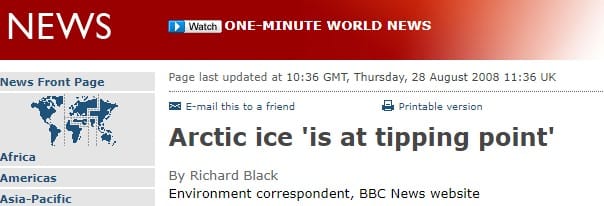
Researchers say the Arctic is now at a climatic “tipping point”.
“We could very well be in that quick slide downwards in terms of passing a tipping point,” said Mark Serreze, a senior scientist at the Colorado-based NSIDC.
“It’s tipping now. We’re seeing it happen now,” he told the Associated Press news agency.
BBC
A mere three years later, the BBC was reporting that something that scientists were “seeing now” in 2008 was not actually being seen at all and may not ever happen:
Scientists say current concerns over a tipping point in the disappearance of Arctic sea ice may be misplaced.
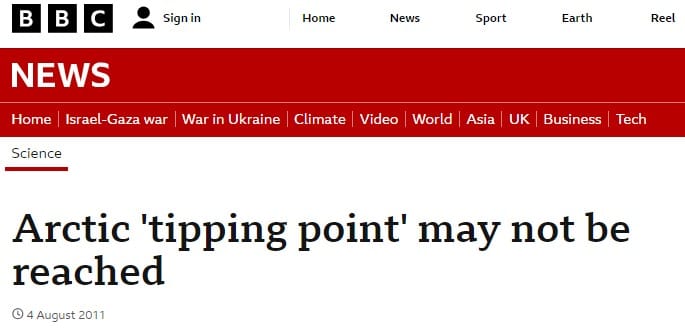
In the interim (2010), the Arctic tipping point had expanded to include polar bears:

Climate change will trigger a dramatic and sudden decline in the number of polar bears, a new study has concluded.
The research is the first to directly model how changing climate will affect polar bear reproduction and survival.
Based on what is known of polar bear physiology, behaviour and ecology, it predicts pregnancy rates will fall and fewer bears will survive fasting during longer ice-free seasons.
These changes will happen suddenly as bears pass a ‘tipping point’.
BBC
This year, even the Guardian was walking back on that one.
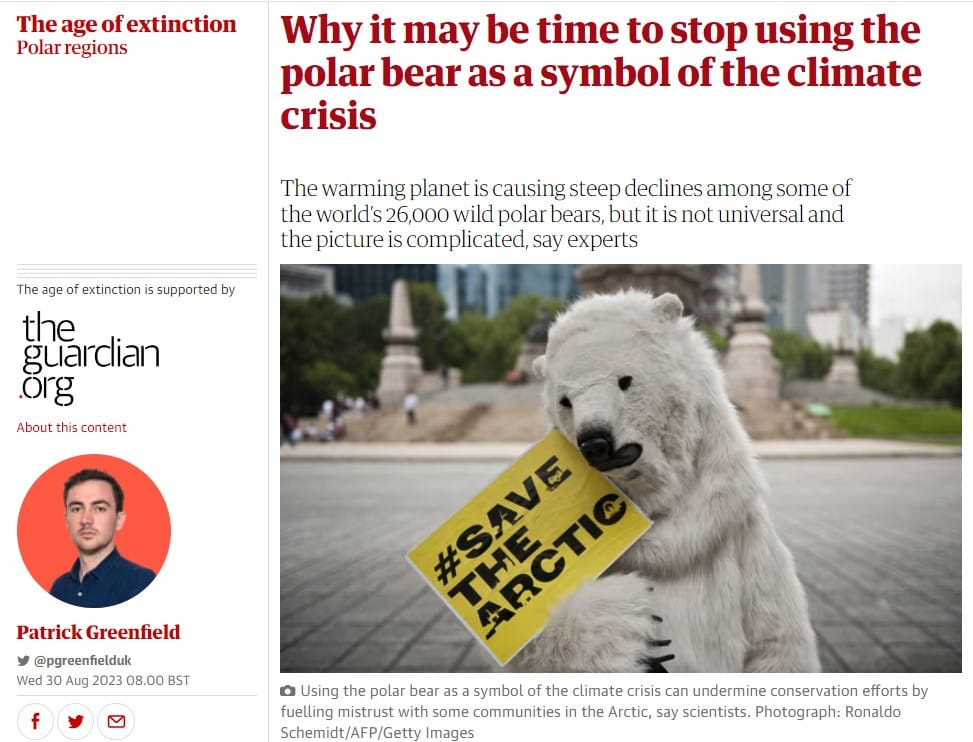
Since the Arctic tipping point had to be abandoned, in 2012 it was time to move to warmer waters, with the Great Barrier Reef at a tipping point according to the Sydney Morning Herald.

Fast forward to 2022 when the Washington Post said:
Marine scientists have found that parts of Australia’s Great Barrier Reef have recorded their highest levels of coral cover since monitoring began nearly four decades ago.
Time for another factor to be alarmed about, so in 2014 they revived the 2005 melting permafrost/methane release alarm.
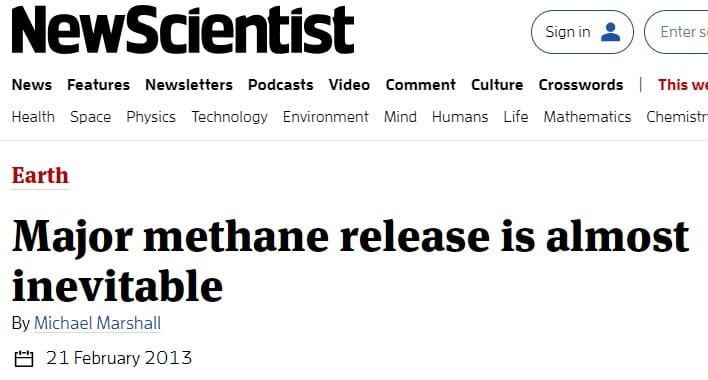
The article went on to say:
We are on the cusp of a tipping point in the climate. If the global climate warms another few tenths of a degree, a large expanse of the Siberian permafrost will start to melt uncontrollably. The result: a significant amount of extra greenhouse gases released into the atmosphere
New Scientist
It is not clear how many a “few tenths of a degree” is, but the world has warmed a few tenths of a degree since 2013, so they tell us (every year is the ‘hottest eva’), and I have yet to smell the result of this major methane release. (Since it did not happen, we now have to blame cow farts as the methane source and ban farming.)
Golly – how time flies, I am only up to 2014. I will have to continue in another article.









